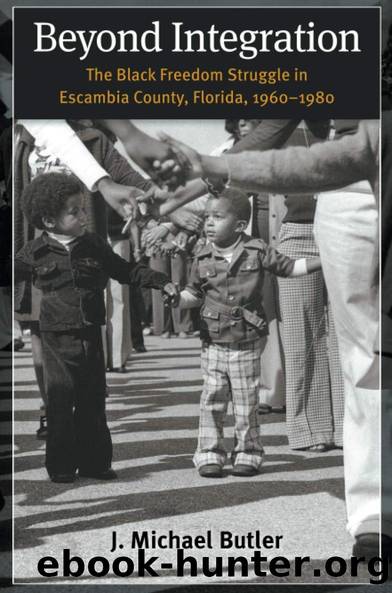Beyond Integration by J. Michael Butler

Author:J. Michael Butler [Butler, J. Michael]
Language: eng
Format: epub
Tags: Social Science, Ethnic Studies, American, African American & Black Studies, History, United States, State & Local, South (AL; AR; FL; GA; KY; LA; MS; NC; SC; TN; VA; WV), Discrimination
ISBN: 9781469627489
Google: GmM3CwAAQBAJ
Publisher: UNC Press Books
Published: 2016-04-12T01:02:24+00:00
Sgt. Jim Edson, 1976. Pensacola Historical Society Collection, UWF Historic Trust.
The grand jury that Golden assembled in the aftermath of the first EHS riot made its investigation conclusions public on February 28. The group focused on the Escambia High tumult but examined racial tensions in all county public schools. Although the grand jury concluded that âa portion ofâ violent episodes in local schools âdoes have racial overtones,â the report did not mention Confederate symbols or white resistance to integration as causes of school unrest. The grand jury, in fact, declared that âthe citizens of Escambia County can take justifiable pride in the general harmony between the races in our area and that, despite some allegations to the contrary, most of our citizens of both races have accepted and welcomed integration with good will.â The absence of âstrict, no-nonsense discipline,â the report documented, represented the most serious problem the county school board faced. The grand jury suggested the board establish alternative schools to separate âcontinual trouble-makers from the other students.â The report implored the county âto increase security precautions, add security personnel where necessary and place increased emphasis on student disciplineâ until the school board established the alternative accommodations.44
The report on area school violence mirrored the monumental divide that existed between whites and blacks in Northwest Florida. The grand jury echoed white beliefs that a minority of malcontents, not racial strife, caused most of the upheaval in county classrooms. Their findings implicitly denied that racial agitation played any role in the campus unrest and did not cite white use of Confederate symbols as possible reasons for the troubles at Escambia High. African American students and parents, in other words, had nothing to complain about. Increased discipline, not action concerning school images that one group considered racially insensitive, would right all wrongs in the county system. The grand jury disclosures provided additional material that marginalized black activists and placed their leaders even more on the defensive, as the report judged the concerns of people like Matthews and Brooks as exaggerations, if not outright fabrications. The report provided yet another piece of official evidence to fuel white claims that black activists exploited the unfortunate series of events in Escambia County for their own selfish reasons and, along with the racist comments of Jim Edson, embodied the challenges and limitations the black freedom struggle in Northwest Florida faced in the era beyond integration. Even in a community like Pensacola, which possessed a tradition of protest against racial injustices that characterized much of the twentieth century, whites preserved their racial privileges in meaningful forms that withstood the legislative and judicial challenges the 1960s movement produced. Institutions that preserved the areaâs racial hierarchy, such as the Pensacola City Council, Escambia County Commission, school board, the state attorneyâs office, and sheriffâs department, remained firmly under white control. These groups were the most instrumental in extending and protecting white supremacy into the 1970s and represent a manifestation of what Michelle Alexander labeled âsystems of controlâ on a more common, pervasive level than she utilized.
Download
This site does not store any files on its server. We only index and link to content provided by other sites. Please contact the content providers to delete copyright contents if any and email us, we'll remove relevant links or contents immediately.
Down the Drain by Julia Fox(980)
The Light We Carry by Michelle Obama(899)
Cher by Cher(797)
Simple Passion by Annie Ernaux(747)
Love, Pamela by Pamela Anderson(603)
The Nazis Knew My Name by Magda Hellinger & Maya Lee(579)
Zen Under Fire by Marianne Elliott(564)
You're That Bitch by Bretman Rock(551)
Novelist as a Vocation by Haruki Murakami(542)
Alone Together: Sailing Solo to Hawaii and Beyond by Christian Williams(532)
The Foxfire Book of Appalachian Women by Kami Ahrens(531)
Kamala Harris by Chidanand Rajghatta(496)
Gambling Man by Lionel Barber(488)
The Barn by Wright Thompson(437)
Drinking Games by Sarah Levy(429)
A Renaissance of Our Own by Rachel E. Cargle(418)
Limitless by Mallory Weggemann(417)
Memoirs of an Indian Woman by Shudha Mazumdar Geraldine Hancock Forbes(415)
A new method to evaluate the dose-effect relationship of a TCM formula Gegen Qinlian Decoction: âFocusâ mode of integrated biomarkers by unknow(415)
